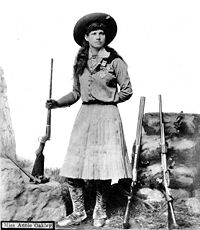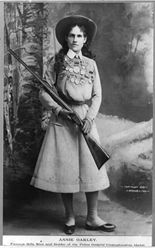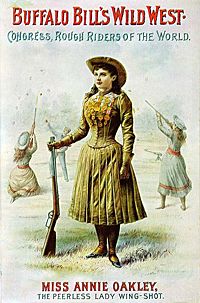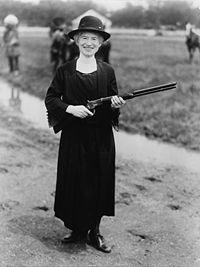Oakley, Annie
(→Representations on stage and screen: image from 1922) |
(→Representations on stage and screen: correction to image) |
||
| Line 50: | Line 50: | ||
==Representations on stage and screen== | ==Representations on stage and screen== | ||
| − | [[ | + | |
| + | [[Image:Annie Oakley NYWTS.jpg|thumb|200px|right|Oakley in 1922]] | ||
* In 1935, Barbara Stanwyck played Annie in a highly fictionalized non-musical film. | * In 1935, Barbara Stanwyck played Annie in a highly fictionalized non-musical film. | ||
* The 1946 musical ''Annie Get Your Gun'' is very loosely based on her life. The original stage production starred Ethel Merman, who also starred in the 1966 revival. The 1950 film version starred Betty Hutton. The most recent revival starred Bernadette Peters, but Reba McEntire played the role after Peters left the show. | * The 1946 musical ''Annie Get Your Gun'' is very loosely based on her life. The original stage production starred Ethel Merman, who also starred in the 1966 revival. The 1950 film version starred Betty Hutton. The most recent revival starred Bernadette Peters, but Reba McEntire played the role after Peters left the show. | ||
Revision as of 15:51, 14 July 2011
| Annie Oakley | |
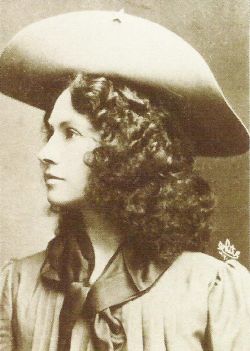 | |
| Born | Phoebe Ann Mosey August 13 1860 Woodland (now Willowdell), Ohio, United States |
|---|---|
| Died | November 3 1926 (aged 66) Greenville, Ohio |
| Spouse(s) | {{#invoke:Message box|ambox}} (m. 1882–1926) |
| Parents | Susan Wise (1830–1908), Jacob Mosey (1799–1866) |
| Signature | |
Annie Oakley, born Phoebe Ann Mosey, was an American sharpshooter and exhibition shooter. Oakley's amazing talent and luck led to a starring role in Buffalo Bill's Wild West show, and propelled her to become one of the first American female superstars. Using a .22 caliber rifle at 90 feet (27 m), Oakley could split a playing card edge-on and put five or six more holes in it before it touched the ground.
Early life
After her first husband's death, Susan Mosey remarried, had another child, and was widowed a second time. During this time, Annie was put in the care of the superintendent of the county poor farm, where she learned to embroider and sew. She spent some time in near servitude for a local family where she endured mental and physical abuse (Annie only referred to them as "the wolves"). Eventually, Annie was able to escape and reunite with her mother.
Annie did not go to school. Apparently, she could not spell her family's name since she later rendered it ending in "ee." Her family's surname, "Mosey," appears on her father's gravestone, in his military record and is the official spelling by the Annie Oakley Foundation, maintained by her living relatives.
Born near North Star, Ohio, Annie was the fifth of seven children. Her parents, Susan and Jacob Mosey, were Quakers from Pennsylvania. A fire burned down their tavern so they moved to a rented farm in Patterson Township, Darke County, Ohio. Her father fought in the War of 1812 and died in 1866 from pneumonia and overexposure in freezing weather.
Annie began hunting at the age of nine to support her siblings and her widowed mother. She sold the hunting game to locals for money, and her skill eventually paid off the mortgage on her mother's house.
Annie soon became known throughout the region as a sharpshooter. During the spring of 1881, the Baughman and Butler shooting act was being performed in Cincinnati. Marksman Francis "Frank" E. Butler (1850-1926), bet a hotel owner $100 ($1900, adjusted for inflation) that he could beat any local fancy shooter. The hotelier arranged a shooting match with Annie, age twenty one, to be held in ten days time in a small town near Greenville, Ohio. Frank later said it was "eighteen miles from the nearest station" (about the distance from Greenville to North Star). After missing his twenty fifth shot, Frank lost the match and the bet. Frank began courting Annie, won her heart, and they began a happy marriage of forty four years on June 20, 1882.
Career
The couple lived in Cincinnati for a time, and Annie is believed to have taken her stage name from the city's neighborhood of Oakley, where they resided. At first, Oakley was Frank's assistant in his traveling show. Later, he realized that Annie was more talented, so he became her assistant and business manager. Annie and Frank's personal and business success in handling celebrity is considered a model show business relationship, even after more than a century.
They joined the Buffalo Bill's Wild West show in 1885. Standing only 5 feet (1.5 m), Annie was given the nickname of "Watanya Cicilla" by fellow performer Sitting Bull, rendered "Little Sure Shot" in the public advertisements. She had such good aim that, at his request, Annie knocked the ashes off a cigarette held by the Prince of Prussia, the future Kaiser Wilhelm II. Oakley later joked that, had her aim been a little worse, she might have averted World War I. She also performed before Queen Victoria and other crowned heads of Europe.
During her first Buffalo Bill show engagement, Oakley experienced a tense professional rivalry with sharpshooter Lillian Smith. Smith promoted herself as younger and, therefore, more billable than Oakley. Oakley temporarily left the Buffalo Bill show, but returned after Smith departed.
Oakley had initially responded to the show's age rivalry by removing six years from her promoted age. She was a modest and proper woman, who couldn't remove any more years without making it seem that she was born out of wedlock after her father died. As it was, her promoted age led to perennial wrong calculations of her true age and the dates for some of her biographical events. For example, the 1881 spring shooting match with Frank occurred when she was a twenty one-year-old adult. However, that event is widely repeated as occurring six years earlier in the fall, which also suggests a myth of a teen romance with Frank.
In 1901, she was badly injured in a railway crash, but she fully recovered after temporary paralysis and several spinal operations. She soon left the Buffalo Bill show and began a quieter stage career in the show, The Western Girl. In 1903, sensational cocaine prohibition stories were selling well. The newspaper magnate, William Randolph Hearst, published a false story that Oakley had been arrested for stealing to support a cocaine habit. She spent much of the next six years winning fifty four of fifty five libel lawsuits against newspapers that printed the story.[1]
Annie continued to set records into her sixties, even after suffering a debilitating automobile accident that forced her to wear a steel brace on her right leg. She engaged in extensive, albeit quiet, philanthropy for women's rights and other causes, including the support of specific young women that she knew.
Annie Oakley died on November 3, 1926, of pernicious anemia, at the age of 66. Her husband, Frank Butler, died just eighteen days later. After her death it was discovered that her entire fortune had been given to family and spent on her charities.
Representations on stage and screen
- In 1935, Barbara Stanwyck played Annie in a highly fictionalized non-musical film.
- The 1946 musical Annie Get Your Gun is very loosely based on her life. The original stage production starred Ethel Merman, who also starred in the 1966 revival. The 1950 film version starred Betty Hutton. The most recent revival starred Bernadette Peters, but Reba McEntire played the role after Peters left the show.
- From 1954 to 1956, Gail Davis played her in the Annie Oakley television series.
- In 1976, Geraldine Chaplin played Annie in Buffalo Bill and the Indians with John Considine as Frank Butler.
- In 1985, Jamie Lee Curtis offered a fresh portrayal in the "Annie Oakley" episode of the children's video series, Shelley Duvall's Tall Tales and Legends.
- In 2006, there was an episode of PBS's American Experience about the life of Oakley.
Notes
- ↑ PBS, Annie Oakley. Retrieved November 21, 2007.
ReferencesISBN links support NWE through referral fees
- Kasper, Shirl. Annie Oakley. Norman: University of Oklahoma Press, 1992. ISBN 0806124180
- McMurtry, Larry. The Colonel and Little Missie: Buffalo Bill, Annie Oakley, and the Beginnings of Superstardom in America. New York: Simon & Schuster, 2005. ISBN 743271718
- Riley, Glenda. The Life and Legacy of Annie Oakley. Norman: University of Oklahoma Press, 1994. ISBN 0806126566
- Heidish, Marc. The Secret Annie Oakley. New York: New American Library, 1983. ISBN 0453004377
External links
- Annie Oakley links. Retrieved November 21, 2007.
- Annie Oakley biography (Women in History). Retrieved November 21, 2007.
- Annie Oakley Foundation's archived page "Tall Tales and the Truth". Retrieved November 21, 2007.
- Annie Oakley Foundation's current web site "Mosey" research page. Retrieved November 21, 2007.
- American Experience | Annie Oakley | People & Events | PBS. Retrieved November 21, 2007.
- "Little Miss Sure Shot" - The Saga of Annie Oakley. Retrieved November 21, 2007.
- short bio, pictures and the 1894 edison motion picture of annie oakley. Retrieved November 21, 2007.
Credits
New World Encyclopedia writers and editors rewrote and completed the Wikipedia article in accordance with New World Encyclopedia standards. This article abides by terms of the Creative Commons CC-by-sa 3.0 License (CC-by-sa), which may be used and disseminated with proper attribution. Credit is due under the terms of this license that can reference both the New World Encyclopedia contributors and the selfless volunteer contributors of the Wikimedia Foundation. To cite this article click here for a list of acceptable citing formats.The history of earlier contributions by wikipedians is accessible to researchers here:
The history of this article since it was imported to New World Encyclopedia:
Note: Some restrictions may apply to use of individual images which are separately licensed.
